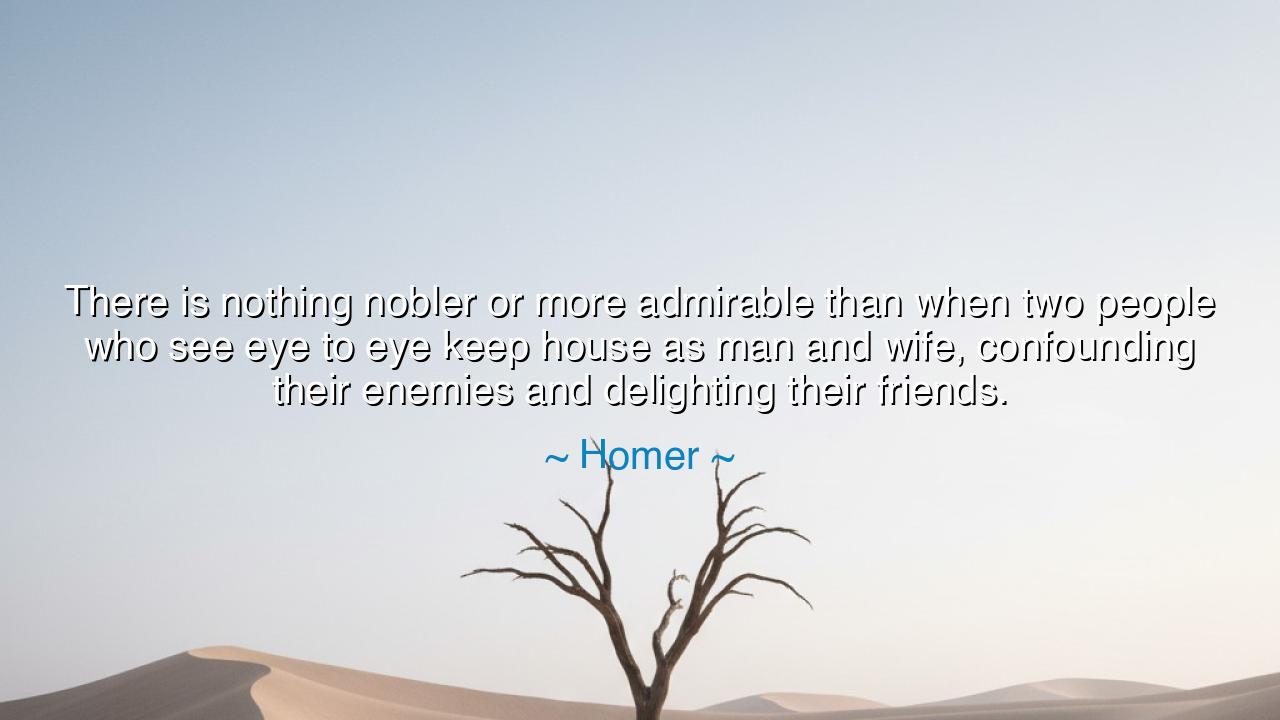
There is nothing nobler or more admirable than when two people
There is nothing nobler or more admirable than when two people who see eye to eye keep house as man and wife, confounding their enemies and delighting their friends.






When Homer wrote, “There is nothing nobler or more admirable than when two people who see eye to eye keep house as man and wife, confounding their enemies and delighting their friends,” he gave voice to one of the most sacred truths of the human condition — that unity between two souls is a fortress stronger than any wall, a harmony deeper than any song. In these words, the ancient poet of The Odyssey spoke not merely of marriage, but of the divine power born when two hearts share a single purpose. For Homer, love and partnership were not fragile emotions; they were the foundation of civilization itself, the quiet heroism that outlasts war and kings.
In the ancient world, this vision of marriage was rare and luminous. Most unions were matters of duty, inheritance, or power. Yet Homer, ever the seer of human hearts, glimpsed something higher — a marriage not of convenience, but of mutual respect and shared vision. He saw in the bond between husband and wife a reflection of cosmic order: the balance of strength and tenderness, reason and emotion, sun and moon. To “see eye to eye,” in Homer’s verse, is not merely to agree — it is to understand, to stand as equals in mind and soul, to look upon the same world and find beauty in the same truth.
This ideal found its living embodiment in the story of Odysseus and Penelope, the immortal pair whose love weathered twenty years of separation, temptation, and hardship. While Odysseus journeyed through the fires of the world, Penelope held steadfast at home, warding off suitors with wit as sharp as her husband’s sword. When they were reunited, their joy was not the passion of youth, but the triumph of enduring unity. They had remained true not only to each other, but to the vision they once shared — a life built upon loyalty, patience, and wisdom. In their reunion, Homer saw the highest victory: a harmony that “confounds enemies” because it cannot be broken, and “delights friends” because it illuminates the power of love grounded in virtue.
Homer’s words are also a meditation on balance and equality. In his time, women were rarely seen as partners in thought or purpose, yet Penelope stands beside Odysseus as his intellectual equal — clever, patient, and steadfast. Their marriage endures not because of dominance, but because of mutual reverence. The poet understood that when two people “see eye to eye,” their unity becomes an unassailable strength. The home they build becomes a temple — not of stone, but of trust. Such a household, Homer suggests, radiates light into the world: it gives courage to friends, silences the mockery of foes, and anchors society in stability and peace.
Across the centuries, this wisdom has echoed in the lives of countless pairs who shared a common purpose. Consider Eleanor and Franklin Roosevelt, who faced depression, war, and illness, yet ruled with one heart. She, his conscience and reformer; he, her strength and strategist. Their unity did not erase difference — it transformed it into power. Like Odysseus and Penelope, they “kept house” not merely by dwelling together, but by building a shared moral vision. Such partnerships remind us that the noblest unions are not born of ease but of struggle overcome together.
In Homer’s teaching, marriage becomes more than companionship — it becomes an art of life, a daily discipline of understanding and generosity. It is a dialogue without end, in which both learn to yield and to stand firm, to comfort and to challenge. When practiced rightly, it creates a strength that no outsider can divide. It is this unity of spirit that “confounds enemies,” for those who live in discord cannot comprehend harmony; and it “delights friends,” for those who love truth rejoice to see love made manifest in daily life.
The lesson Homer leaves us is timeless: true partnership is not founded on passion alone, but on shared vision, respect, and perseverance. To “see eye to eye” is not to never disagree, but to always return to understanding. It is to build a life where both voices matter, where both hearts labor toward the same light. The wise know that this is no easy art — it demands humility, forgiveness, and constant tending, as one tends a sacred fire.
So, let his words be remembered as a blessing and a challenge: to love not only with affection, but with purpose and equality; to make of your household not a battleground, but a refuge of strength. For indeed, as Homer teaches, there is no greatness higher, no triumph sweeter, no virtue nobler, than when two souls walk side by side — united in mind and spirit — and in their unity, create peace that endures beyond their mortal days.






AAdministratorAdministrator
Welcome, honored guests. Please leave a comment, we will respond soon